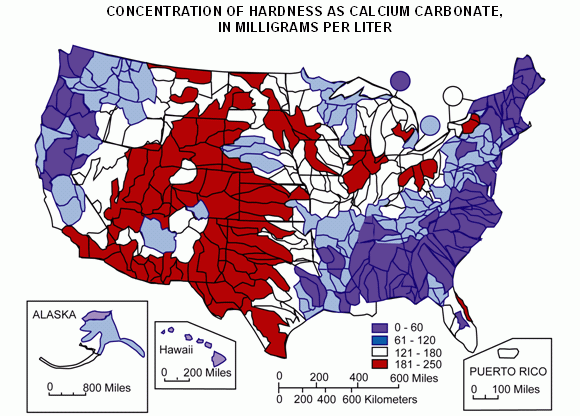If you are diagnosing water problems in your home, then one of the first things you might consider is you water hardness. While hardness isn’t necessarily something that you’d find in your CCR water quality report or normal water quality data, it’s an important reference point.
One of the best shortcuts for determining if you have hard water is by looking at a map…
US Water Hardness Map

Source: US Geological Survey
This map measures the typical concentration of calcium carbonate in water. The higher the number, the harder your water is. This concentration is typically measured in PPM (parts per million) but you might also see it in GPG (grains per gallon). In case you don’t keep a converter calculator with you here are some handy reference points:
- 1 GPG equals 17.1 PPM
- 100 PPM equals 5.85 GPG
Water Hardness Rating Chart
If you are trying to figure out how hard your water is, here is a comparison chart you can use to understand your relative hardness. This description of these values will vary based on who you talk to, with some people considering, say, 75 PPM to be soft water while others stating 60 as the cutoff. Even so, this will be directionally correct and will help you decide if you should consult a water professional for next steps.
| Rating | Description |
|---|---|
| 0 – 60 PPM 0 – 3.50 GPG |
Soft water |
| 61 – 120 PPM 3.56 – 7.00 GPG |
Moderately soft water |
| 121 – 180 PPM 7.06 – 10.50 GPG |
Medium hard water |
| 181 – 250 PPM 10.56 – 14.59 GPG |
You have hard water |
| 251 – 350 PPM 14.64 – 30.43 GPG |
Very hard water |
| 350+ PPM 20.48 GPG |
Extremely hard water |
At What Level Do I Consider A Water Softener?
A water softener can be an expensive addition to a home, but it can save you thousands of dollars in extending the lifespans of water heaters, coffee machines, dishwaters, shower heads, and other items around your home. Overly hard water is also tough on your hair and skin, so this can be a great quality of life improvement as well.
Ultimately, you probably know if you should be considering a water softener based on how you feel about the quality of your shower and how your appliances are holding up to calcium and other mineral deposits, but if you want some reference points, here they are…
- From 100 to 150 PPM: You should consider a water softener, but only for quality of life
- 150 to 250 PPM: You should strongly consider a water softener to extend the life of your appliances, boiler, etc.
- Above 250 PPM: You basically need a water softener
Is It Safe To Drink Hard Water?
While hard water can cause a lot of problems with washing shampoo out of your hair and soap to fail to work as well as you’d like, it is generally considered to be safe to drink. Assuming you have healthy kidneys and no other specific conditions that would be affected by your water intake, it’s very unlikely that an abundance of calcium and magnesium — the two most common outlying ingredients in hard water in the United States — would cause any health problems.
By way of example, according to McGill University, ingesting 2 liters of moderately hard water a day would give you about 52 milligrams of additional magnesium a day. The recommended daily allowance of magnesium is 400-420 mg a day for men and 310-320 mg for women, so the overall effect of the additional minerals would be notable but not enough to have to change your lifestyle if you were otherwise in good health.
